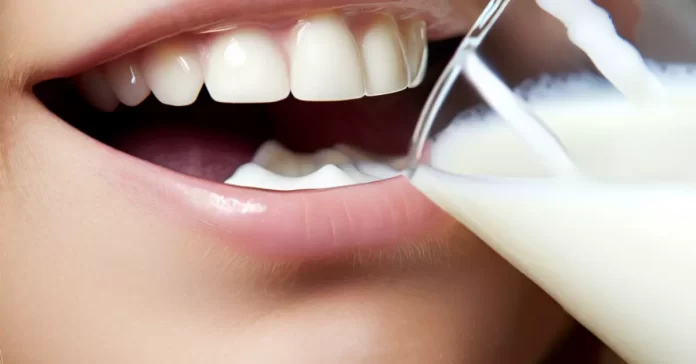In discussions about dental health, we often stress the importance of regular brushing, flossing, and dental check-ups. There’s another easy addition to your daily habits that can significantly contribute to having strong and healthy teeth – drinking milk.
The Calcium Connection
One of the key elements in milk that benefits your teeth is calcium. Calcium is a mineral well-known for its role in building and maintaining strong bones, but it’s equally important for your dental health. In fact, about 99% of the body’s calcium is found in teeth and bones.
How Calcium Helps Your Teeth
So, how does calcium from milk benefit your teeth? Here are the ways:
- Strengthens Tooth Enamel: Tooth enamel, the outermost layer of your teeth, serves as a protective shield. Calcium helps to strengthen and remineralize tooth enamel, making it more resistant to decay and erosion caused by acids from food and bacteria.
- Supports Jawbone Health: Calcium plays a vital role in both teeth and the strength of the jawbone that supports them. Consuming sufficient calcium helps maintain the integrity of your jawbone, which is essential for keeping your teeth firmly in place.
- Counteracts Acidic Damage: Consuming acidic foods and drinks can temporarily weaken your tooth enamel. Calcium, along with phosphate and fluoride found in saliva, helps to neutralize these acids and restore the balance in your mouth.
- Reduces the Risk of Tooth Decay: A diet rich in calcium can reduce the risk of tooth decay, as it promotes a more robust enamel and enhances the overall health of your teeth.
Other Nutrients in Milk
In addition to calcium, milk contains several other essential nutrients that support dental health:
- Vitamin D: Vitamin D helps your body absorb calcium more effectively. It’s often added to milk, making it a convenient source of this vital nutrient.
- Phosphorus: Phosphorus works alongside calcium to strengthen tooth enamel and bones.
- Casein: Milk contains a protein called casein, which forms a protective film over your teeth, guarding them against acid and bacteria.
- Water: Milk’s high water content helps to rinse away food particles and bacteria, promoting a cleaner mouth.
How to Incorporate Milk for Dental Health
Incorporating milk into your daily diet is relatively easy and delicious. Here are some tips:
- Drink It: Enjoy a glass of milk as a part of your breakfast or as a nutritious snack. Opt for low-fat or fat-free varieties if you’re concerned about calorie intake.
- Use It in Cooking: Milk finds its place in recipes, from creamy soups to smoothies and desserts. It not only enhances flavor but also increases nutritional value.
- Combine with Other Dental-Friendly Foods: To create a tooth-friendly meal, combine milk with fiber-rich foods such as fruits and vegetables.
- Consult Your Dentist: If you have specific dental concerns or dietary restrictions, consult your dentist or a nutritionist for personalized advice on incorporating milk into your diet.
Final Thoughts
Milk contributes to dental health, but it’s just one component of a comprehensive strategy. A robust dental routine, including regular check-ups, proper oral hygiene, and a balanced diet, is essential for maintaining strong and healthy teeth. Incorporating milk into your diet and practicing good oral care can help ensure a radiant smile and lasting dental well-being.
Frequently Asked Questions (FAQs)
Is milk good for my teeth?
Indeed, milk is significant for your teeth because it’s rich in calcium, which strengthens tooth enamel.
How does calcium in milk benefit dental health?
Calcium helps to strengthen tooth enamel, supports jawbone health, and reduces the risk of tooth decay.
Can drinking milk alone ensure strong teeth?
While milk is beneficial, it’s essential to maintain good oral hygiene practices and a balanced diet for optimal dental health.
Are there other dairy products that can help teeth?
Yes, dairy products like yogurt and cheese also provide calcium and can benefit dental health.
Is it safe to include milk in your diet for dental health if you’re lactose intolerant?
Lactose-free or dairy alternatives like almond milk fortified with calcium can be suitable options.
How much milk should I drink daily for dental benefits?
A dietary guideline recommends including two to three servings of calcium-rich dairy or dairy alternatives in your daily diet.
Can children benefit from milk for their dental health?
Yes, milk is essential for developing strong teeth in children and adolescents.
Are there any side effects of consuming too much milk for dental health?
Consuming excessive amounts of milk may lead to health issues like excessive calorie intake, so it’s essential to maintain a balanced diet.










